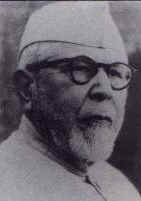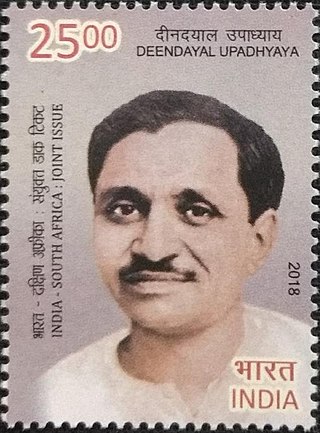
Zakir Husain Khan was an Indian educationist and politician who served as the third president of India from 13 May 1967 until his death on 3 May 1969.

Sir Syed Ahmad Khan, also spelled Sayyid Ahmad Khan, was an Indian Muslim reformer, philosopher, and educationist in nineteenth-century British India.

Muhammad Quli Qutb Shah was the fifth sultan of the Qutb Shahi dynasty of Golkonda and founded the city of Hyderabad, in South-central India and built its architectural centerpiece, the Charminar. He was an able administrator and his reign is considered one of the high points of the Qutb Shahi dynasty. He ascended to the throne in 1580 at the age of 15 and ruled for 31 years.

Old Delhi is an area in the Central Delhi district of Delhi, India. It was founded as a walled city and officially named Shahjahanabad in 1648, when Shah Jahan decided to shift the Mughal capital from Agra. The construction of the city was completed in 1648, and it remained the capital of Mughal India until its fall in 1857, when the British Empire took over as paramount power in the Indian subcontinent.

Mohammad Ajmal Khan, better known as Hakim Ajmal Khan, was a physician in Delhi, India, and one of the founders of the Jamia Millia Islamia university in Delhi, India. He also founded another institution, Ayurvedic and Unani Tibbia College, better known as Tibbia College, situated in Karol Bagh, Delhi. He was the only Muslim to chair a session of the Hindu Mahasabha. He became the university's first chancellor in 1920 and remained in office until his death in 1927.

Hakeem Muhammad Saeed was a Pakistani medical researcher, scholar, and philanthropist. He served as governor of Sindh Province from 19 July 1993 until 23 January 1994. Saeed was one of Pakistan's most prominent medical researchers in the field of Eastern medicine.

Hakim Syed Zillur Rahman is an Indian scholar of Unani medicine. He founded Ibn Sina Academy of Medieval Medicine and Sciences in 2000. He had earlier served as Professor and chairman, Department of Ilmul Advia at the Ajmal Khan Tibbiya College, Aligarh Muslim University, Aligarh, for over 40 years before retiring as Dean Faculty of Unani Medicine. Presently, he is serving AMU as "Honorary Treasurer". In 2006, the Government of India awarded him the Padma Shri for his contribution to Unani Medicine.

Mahmud Hasan Deobandi was an Indian Muslim scholar and an activist of the Indian independence movement, who co-founded the Jamia Millia Islamia University and launched the Silk Letter Movement for the freedom of India. He was the first student to study at the Darul Uloom Deoband seminary. His teachers included Muhammad Qasim Nanawtawi and Mahmud Deobandi, and he was authorized in Sufism by Imdadullah Muhajir Makki and Rashid Ahmad Gangohi.

Ibn Sina Academy of Medieval Medicine and Sciences (IAMMS) is a trust registered under the Indian Trusts Act, 1882. Mohammad Hamid Ansari, former vice-chancellor of Aligarh Muslim University, Aligarh, formally inaugurated it on 21 April 2001. Department of AYUSH, Ministry of Health and Family Welfare, Government of India gave accreditation to the academy in 2004 and promoted it as 'centre of excellence' in 2008. Membership of the academy is open to anyone who has an interest in the academy's activities particularly on history of medicine and history of science. Being a charitable organization, donations to the Academy are also exempted from Income Tax under section 80G of the Income Tax Act 1961.

Hakim Syed Muhammad Karam Hussain was an Unani practitioner from Tijara, Alwar.

Abdul Majeed Khwaja was an Indian lawyer, educationist, social reformer and freedom fighter from Aligarh. In 1920, he along with others founded Jamia Millia Islamia and later served its vice chancellor and chancellor.
Saghar Nizami (1905–1983), also known as Samad Yar Khan, was an Indian poet and writer of ghazal and nazm in Urdu. He was one of the earliest disciples of Seemab Akbarabadi (1882–1951) and was a recipient of the third highest Indian honour of the Padma Bhushan, in 1969, for his contributions to literature.

Deendayal Upadhyaya was an Indian politician, a proponent of integral humanism ideology and leader of the political party Bharatiya Jana Sangh (BJS), the forerunner of Bharatiya Janata Party (BJP). Upadhyaya started the monthly publication Rashtra Dharma, broadly meaning 'National Faith', in the 1940s to spread the ideals of Hindutva revival. Upadhyaya is known for drafting Jan Sangh's official political doctrine, Integral humanism, by including some cultural-nationalism values and his agreement with several Gandhian socialist principles such as sarvodaya and swadeshi (self-sufficiency).

Hakim Abdul Aziz was a prominent Unani physician in British India.
Kausar Chandpuri was an Indian Unani physician and Urdu writer who gained repute as a novelist, short story writer and literary critic.
The Aligarh Movement was the push to establish a modern system of Western-style scientific education for the Muslim population of British India, during the later decades of the 19th century. The movement's name derives from the fact that its core and origins lay in the city of Aligarh in Central India and, in particular, with the foundation of the Muhammadan Anglo-Oriental College in 1875. The founder of the oriental college, and the other educational institutions that developed from it, was Sir Syed Ahmed Khan. He became the leading light of the wider Aligarh Movement.
Zafar Ahmad Nizami was an Indian author, poet and writer. He served the Jamia Millia Islamia as Professor of Political Science for about 30 years and authored books like Memarān-e-Jamia, Hindustān ke chand Siyasi Rahnuma, Maulana Azad Ki Kahani and Tarīkh-e-Hind: Ahd-e-Jadeed.

Hakim Muhammad Hassan Qarshi was a practitioner of Unani medicine, author, and the founder of Qarshi Dawakhana. He was a student of Hakim Ajmal Khan and the family physician of Muhammad Iqbal from 1934 to 1938.













